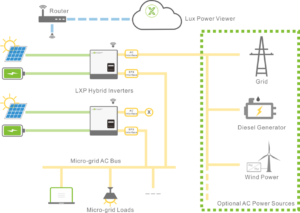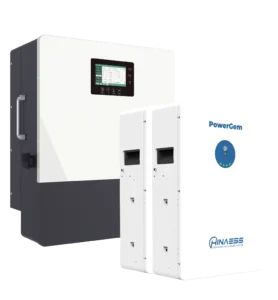Inverter Generator vs Regular Generator is a widely asked question. People sometimes cannot decide between these two. If you are one of them, this article is what you seek.
Imagine you are on a camping trip and need backup power. Or, in the middle of an important work presentation at home, the power goes out. Backup power is a must during an outdoor wedding. Besides, backup power is always necessary at a busy construction site. So, you can realize that people rely on backup power daily, especially in the modern world. Generators are an excellent solution here.
With a regular generator, the noise is overwhelming. But with an inverter generator, peace & quiet environments are maintained. However, you do not need batteries for a regular generator, while an inverter generator needs one. So, when choosing the right generator, several factors come into play.
This article mainly highlights the difference between Inverter Generator and Regular Generator.
What Is a Regular Generator or Fuel Generator?
A regular generator has many names. Some people call it a fuel generator, while others call it a diesel generator. This generator typically converts mechanical energy into electrical energy. It runs on fossil fuels, like gasoline, diesel, or propane.
A regular generator operates using an internal combustion engine. The engine burns the fuel and produces torque. This torque generally produces rotational energy. You can easily create AC electricity using a wheel and a dynamo. That’s how a fuel generator works.
A regular generator can be used in many places. Typical examples are outdoor events, construction sites, home backup power, and more.
Pros
- Fuel generators can produce a higher power output. Therefore, you can use this device for heavy-duty applications.
- It is readily available in various sizes and fuel types.
- The initial cost of a regular generator is typically less.
- Simple technology, easy to repair and maintain
Cons
- The regular generator creates loud noises. Therefore, it is not suitable for places where quiet is necessary.
- Fuel generators are less fuel efficient, typically up to 40%.
- It produces gas, which is harmful to the environment.
- It can not produce stable power output. Therefore, it is not suitable for delicate electronic devices.
- They are bulkier and heavier, making them difficult to carry.
What Is an Inverter Generator or An Inverter Battery Generator?

An inverter generator typically converts DC power into AC power or vice versa. In most off-grid systems, inverter generators take DC power from the battery. A solar-powered inverter generator can take the DC power directly from the solar. However, most household appliances mainly use the AC power it generates.
An inverter generator mainly works in three stages: battery/solar, DC to AC or vice versa, and Output. Lux Power Hybrid inverter generator works in two ways. It can store energy in batteries and, again, take the energy when necessary. The primary function of this generator is to convert DC to AC or vice versa. However, there is a lot more cool stuff there.
An inverter generator can be used in your house, for outdoor camping, remote work, or anywhere else. It is lightweight and can be carried anywhere.
Pros
- Generally, it is much quieter. You won’t almost feel any noise.
- It produces clean and stable power, which is suitable for most electronics.
- It is the most efficient inverter generator, up to 95% – 97%
- It is eco-friendly because it doesn’t produce any harmful gases.
Cons
- The initial cost is high. You will need a battery to store and take DC power.
- Initial setup, especially wiring, needs an expert job.
What is The Difference between Inverter Generator and Regular Generator
The above two sections show their basic working principles. We have also mentioned their pros, cons, and uses.
In our daily lives, we use both generators a lot. However, the right choice could vary based on the situation. Let’s look at the five main things that set them apart.
Inverter Generator vs Regular Generator: Noise
As you learned in the last part, a fuel generator comprises a combustion engine and a dynamo. The combustion process is the primary source of noise in this device. If you know how a combustion engine works, you may already know how gas is created inside.
When the fuel burns inside the engine, rapid gas expansion occurs. This repeated process usually creates high noise levels. In addition, the internal metal parts also take part in overall noise levels.
On the other hand, the working principle of inverters is much quieter. They use advanced electronics to convert DC power from the battery to AC power. You may be using only solar or wind power. In this case, the inverter generator takes the DC power directly from the solar generator. In most cases, these two generators are combined. This whole process generally creates almost no noise.
Noise levels are a very critical factor. In residential areas, loud generators can disturb you. In these cases, inverter generators are a great choice. Similar situations can be observed in offices, libraries, public areas, or coffee shops.
Inverter Generator vs Regular Generator: Capacity
Concerning capacity, fuel generators typically offer more than solar-powered inverter generators. A regular generator can produce power output from 1000 watts to 10,000 watts. It can power up a wide range of machinery.

On the other hand, a regular hybrid solar inverter generator can produce power output from 1000 watts to 5000 watts. It may produce less power than fuel generators but is more efficient.
Fuel generators offer only up to 40% efficiency. Considering fuel consumption, this percentage is not productive. But on the other hand, solar inverter generators are way more efficient. They generally offer power output efficiency up to 95% to 97%. These hybrid inverters are known as the most efficient inverter generators.
Moreover, fuel generators can not produce stable power. They create unstable output power, causing voltage spikes. As you know, sensitive electronics like TVs need stable power. Therefore, fuel generators may not be a good solution for these devices. Inverter generators, on the other hand, produce stable power (constant sine wave).
Inverter Generator vs Regular Generator: Cost
As the name suggests, fuel generators run on fuels like gasoline or diesel. After purchasing one, you will need fuel. Although the initial cost is cheap, eventually, you will have to pay more for fuel. So, it is not cost-effective when considering efficiency, productivity, and TOC.
On the other hand, inverter generators have a higher initial cost. Even then, they usually need batteries for a DC power source. Combining both the device and batteries increases the overall cost. But you don’t need consumables over time, which decreases the TOC. Because of this, they are cost-effective options.
You should also consider the cost of maintenance. Fuel engines may need to be fixed or replaced after a specific time, which will cost more.
However, inverter generators need a little upkeep. But in a specific period, you may need to replace your batteries. Because you know, all batteries have a fixed lifetime. So, consider it as well.
Inverter Generator vs Regular Generator: Maintenance
Maintaining regular generators is generally necessary to guarantee their best possible operation. If not, you can run across several problems. Clogs and worn-out spark plugs are two typical problems.
On the other hand, battery inverter generators need less upkeep. You may need to monitor battery health, and occasionally, you need to check the wiring and connection. Most batteries last 3-5 years.
As you know, inverter generators are less complex. Because of this, they need less upkeep. Oil changes, fuel management, or regular engine component checks are unnecessary.
Inverter Generator vs Regular Generator: Ease of Use
From the section “What is a Regular Generator?” you now know how to use it. You saw that it typically requires more effort to set up and operate. However, it doesn’t require advanced studies or experience. Besides, they can be bulky or heavy, so sometimes changing their place is challenging.
Battery inverters are user-friendly, lightweight, and easy to carry. Most inverter generators have a digital display, making them easy to understand.
Homeowners, campers, and contractors always look for simple, easy setup devices. Experts recommend battery inverters for people who need to set up quickly. They are also easy to move around and require less maintenance.
Summary
Let’s wrap everything up! Inverter generators and regular generators differ mainly in some crucial factors. Inverter power generators are quiet, work well, and are environmentally suitable. On the other hand, fuel generators are cheap and don’t need batteries. So, each choice has its pros and cons.
Check out the following table for a quick review of Inverter Generator vs Regular Generator.
|
Aspect |
Inverter Generator |
Regular Generator |
|
Noise |
Quit operation |
Loud operation |
|
Capacity |
Lower capacity |
Higher capacity |
|
Power quality |
Produces clean & stable power |
Produces less stable power |
|
Suitability |
Suitable for running electronics |
Not ideal for electronics like TVs |
|
Efficiency |
Most Efficient Generator, 95% to 97% |
Less efficiency, up to 40% |
|
Maintenance |
Lower maintenance needs |
Higher maintenance needs |
|
Emissions |
Environmentally friendly |
Higher emissions, not eco-friendly |
|
Cost |
Higher initial cost but more efficient |
Lower initial cost, higher consumption cost |
If you have any questions about power generators, don’t hesitate to contact us. You can also visit our website to learn more about our services. You are welcome to our customer service sections. Our team of experts are always happy to assist.

